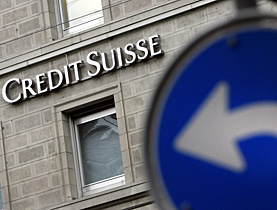Credit Suisse reforms pay amid bonus blowout

In a fundamental overhaul of its compensation structure, bank Credit Suisse has said its executives will wait years before receiving cash and stock bonuses.
It made the announcement on Tuesday, less than two weeks before Switzerland’s financial regulator, Finma, will release new rules governing pay within the financial services industry.
Across the Atlantic, Wall Street is set for another pre-crisis bonus season months after some of its most venerable institutions were either rescued by taxpayers or went bust.
Pressure on regulators has increased to dampen the type of risk-taking by banks that produced short-term payouts and a global financial crisis.
The Group of 20 leading economies pledged to address risk and compensation when they met in Pittsburgh last month.
The Credit Suisse scheme is “both a significant change and a further development of what we’ve had for many years,” a spokesman for the Zurich-based bank told swissinfo.ch on Wednesday.
Its rules, which govern pay for 2009 and beyond, will enter into force on January 1, 2010, the same day as Finma’s. They will apply to compensation for just over 7,000 senior staff.
From bailout to blowout
What does this mean for Switzerland? Major banks and securities firms in the US are following up a spectacular reversal of fortune last year with another about face this year: they will pay out around $140 billion (SFr141.5 billion) in compensation.
But in London, another world financial centre, bankers and hedge fund managers are fleeing a dramatic rise in taxes for rich expatriates. Many are ending up in Switzerland.
“Switzerland remains a very attractive place,” says Guy de Brabois, a Zurich-based financial recruiter at the firm Robert Waters.
He speculates that bankers would rather defer their compensation than lose it to taxes in Britain, and that movement within the industry, particularly in Switzerland, will be minimal.
Nearly a year ago, bank UBS introduced a variable compensation scheme similar to that at Credit Suisse following months of mounting pressure from shareholders and a bailout worth SFr6 billion from the Swiss government.
Credit Suisse says it is balancing the interests of shareholders, regulators and employees. It is not alone. Its peers both at home and abroad are trying to strike a balance between providing the financial incentives needed to retain talent and responsible corporate citizenship.
“It’s definitely a step in the right direction,” said Alain Bichsel, Finma’s head of communications, said of Credit Suisse’s announcement.
Finma standard
It remains to be seen whether the bank’s regulations will meet the Finma standard. The supervisory body is mum on the final version of its rules. As for the timing, Bichsel said: “It’s up to them.”
When it invited banks to comment on a draft set of rules, Credit Suisse wrote: “The proposal goes too far in many areas and can therefore lead to competitive distortions.”
The bank wants Finma to coordinate with regulators in Britain, the European Union and the US before its rules enter into force.
Whither Credit Suisse? The bank is poised to hand out higher base salaries but vest stock for four years, hold cash bonuses for three years and leave room for claw backs.
On that front, it is far ahead of its American rivals. Goldman Sachs is mulling similar changes but has made no public announcement. It outlined new pay standards in May and will donate $200 million to its foundation as it anticipates a bumper fourth quarter. It recently repaid a $10 billion loan to the US government.
There is little enthusiasm on Wall Street for pay cuts. Bank of America CEO Ken Lewis, one of the country’s top bankers, took the lead and agreed to accept no remuneration this year. Nobody followed him.
Justin Häne, swissinfo.ch
Credit Suisse says its new compensation structure “is consistent with the guidelines for pest practices” announced at the G-20 summit in September.
The deal will alter the mix of variable and fixed compensation for managing directors and directors, affecting more than 7,000 employees worldwide and around 2,000 in the US.
Credit Suisse says the measures are designed to “align long-term employee and shareholder interests”.
The bank will continue to “refine” the plan to comply with regulations.
In the US, the Federal Reserve is planning its own rules for pay at all levels within banks.

In compliance with the JTI standards
More: SWI swissinfo.ch certified by the Journalism Trust Initiative




You can find an overview of ongoing debates with our journalists here. Please join us!
If you want to start a conversation about a topic raised in this article or want to report factual errors, email us at english@swissinfo.ch.